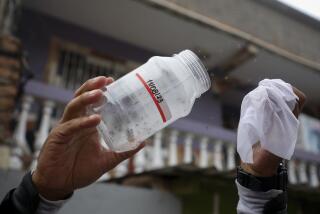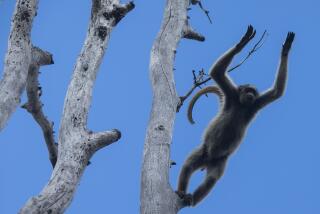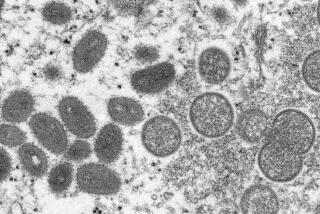Ebola drug, grown in tobacco, effective in monkeys with symptoms
An experimental Ebola treatment -- produced in the leaves of specially engineered tobacco plants -- saved the lives of three monkeys who were already showing symptoms of the illness, according to a report published Wednesday in the journal Science Translational Medicine.
The report suggests that it may be possible someday to treat people who show up in medical facilities already sickened with the horrific disease.
While scientists already knew that various Ebola treatments administered before symptoms appeared were effective in animals such as monkeys, they hadn’t yet shown that such treatments worked once fevers and other symptoms had set in -- a key capability in real-world outbreak situations, said study coauthor and virologist Gene Olinger of the Army Medical Research Institute of Infectious Diseases at Ft. Detrick, Md.
“We’ve pushed the opportunity to treat people to the point where they walk in and say, I have a fever,” he said. “A lot of folks in the field would have thought protecting an animal at the time of fever and viremia is too late to have a clinical benefit.”
Working in a high-security laboratory, the team tested the drug, known as MB-003, on seven rhesus macaques who were deliberately infected with Ebola -- an RNA virus that causes fevers, sore throat, diarrhea and vomiting and internal and external bleeding. The illness is often fatal.
Study first author James Pettitt, also of Army medical research institute, said that the goal was to “simulate what would happen in an outbreak,” so the team waited until the monkeys: a) tested positive for Ebola; and b) had fevers before initiating treatment. All seven monkeys met both criteria over the course of five days, Pettitt said.
The team administered doses of MB-003 intravenously once every three days. Four of the monkeys died of Ebola, but three survived. While 43% success may seem underwhelming, it’s a result that is statistically significant, the researchers said. For experimental purposes, they added, they had to stick to the once-every-three days regimen. But Pettitt said that it’s likely that if MB-003 were being administered in the field, health workers would increase the dosage and frequency of treatment once patients fell ill, perhaps to once a day.
“We think we’ll get better results,” he said.
The antibodies in MB-003 are manufactured in specially engineered tobacco plants, grown in a greenhouse facility in Kentucky, Olinger said. The process is quick, currently allowing production of more than a hundred doses of the drug in a seven-day cycle. At the moment, it’s also cheaper than the cell-based manufacturing methods usually used to produce such drugs.
The next step for MB-003 will be for researchers to try to improve the drug’s efficacy by incorporating additional antibodies identified by another research team. Scientists may also apply to begin drug safety trials in humans, Olinger said.
Additional treatments, as well as vaccines to prevent the disease, are also in the works.







